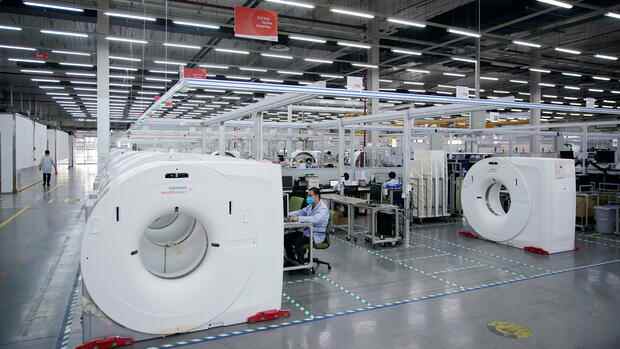Lockdowns in China’s economic metropolis also affected the quarterly result.
(Photo: Reuters)
Frankfurt The lockdown in China and lower demand for the Covid-19 rapid test slowed down the medical technology group Siemens Healthineers significantly in the third quarter of the financial year. From April to June, the turnover of the Erlangen-based company fell on a comparable basis by 5.7 percent to just under 5.2 billion euros. Adjusted operating profit (EBIT) fell by 19 percent to 765 million euros. Analysts had expected an average of 805 million euros here. The figures were not well received on the markets: the share collapsed by almost seven percent after the start of the stock market.
Including currency effects, the Dax group was able to increase its sales by 3.7 percent. Healthineers CEO Bernd Montag confirmed the annual targets for the current fiscal year, which ends on September 30. The company is targeting an increase in sales of between 5.5 and 7.5 percent and adjusted basic earnings per share of between EUR 2.25 and EUR 2.35.
In the same period of the previous year, the Siemens subsidiary recorded a particularly strong quarter with an increase in sales of almost 39 percent. At that time, the demand for corona tests drove the numbers: From April to June 2021, around 600 million euros were spent with rapid antigen tests. In this quarter it was around half, as Healthineers boss Bernd Montag explained in the conference call.
Montag rates the third quarter as strong despite the decline in earnings. Disruptions in the supply chains and lockdowns caused by the pandemic have led to sales being postponed to the following quarters, and cost increases are having a negative impact on profits, Montag said.
Top jobs of the day
Find the best jobs now and
be notified by email.
Excluding the contribution from rapid antigen testing, Siemens Healthineers increased revenue by 0.9% on a like-for-like basis, driven by non-diagnostics businesses. However, sales growth in all segments was impacted by the lockdowns in China. The bottom line is that profit after tax fell by eight percent in the third quarter to 364 million euros. Adjusted basic earnings per share fell by 24 percent to EUR 0.43.
At the end of July, competitor Philips also reported clearly negative effects of the China lockdowns and disruptions in the supply chain. The Dutch group had even withdrawn its annual forecast. From April to June, Philips sales fell by seven percent to 4.17 billion euros, the operating result (EBITA) collapsed to 216 million euros, after 532 million in the same period last year.
The best business quarter of the year is yet to come
The decline in earnings at Healthineers was also due to higher procurement and logistics costs, which could not be fully offset by efficiency measures. The Erlangen-based company now wants to pass on the increased costs to customers. Until the higher prices have prevailed, the Dax group expects a muted margin development.
For the current fourth business quarter, however, company boss Montag is optimistic overall: He expects the highest quarterly sales of the year and a strong result. Incoming orders continue to be very good. In addition, the company expects demand for rapid Covid-19 antigen tests to increase again and now expects total test sales of EUR 1.5 billion for the financial year instead of the previous EUR 1.3 billion.
>> Read also: Fujifilm is investing billions in the healthcare business – and is taking action Siemens Healthineers
In the largest business segment, Imaging, which combines imaging diagnostic procedures such as computed tomography and magnetic resonance imaging, sales increased on a comparable basis by 2.5 percent to EUR 2.6 billion. At 18.4 percent, the segment’s adjusted EBIT margin was above the level of the prior-year quarter.
According to the company, magnetic resonance imaging grew very strongly, while sales of molecular imaging and ultrasound fell, mainly due to lockdown-related disruptions in the supply chains. The two business areas Varian (cancer therapies) and Advanced Therapies, in which imaging methods and software programs for surgical interventions are offered, among other things, increased their sales. Due to higher procurement costs, however, the margins of the same quarter of the previous year were not achieved.
In the second largest business area, diagnostics, sales fell by 23.9 percent to 1.4 billion euros due to the lower demand for rapid tests. The segment’s adjusted EBIT margin was 12.6 percent and was thus well below the figure of 21 percent for the strong prior-year quarter.
More: Divided Dax world: corporate profit forecasts are changing at record speed
